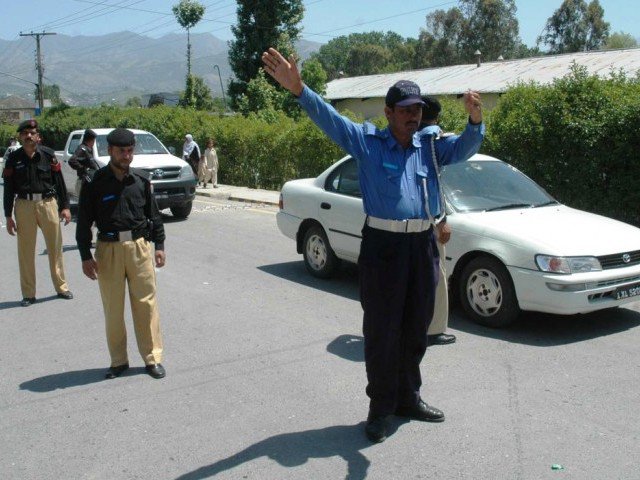
A file photo of a traffic warden.
PHOTO: FILE
Are our traffic wardens the only ones who need psychotherapy?
Stories of the police beating civilians are common but putting the blame squarely on the traffic wardens is wrong.
A recent news piece mentioned traffic wardens in Lahore being given psychotherapy sessions in light of their unruly behaviour. It appears to be a good move on the surface, but is it only the traffic wardens who need these sessions?
If one makes a list of the most disliked authority figures in Pakistan, it would have traffic wardens at the very top. This is not a phenomenon that is common to a select few – it is much bigger than that. I remember growing up in Lahore, and learning to drive. Every now and then when I would be out with a group of friends (before I even had a driver’s license) pulling off shenanigans that would give us traffic violation tickets in any other country, a prime target of ours would be the wardens. Hurling abuses, poking fun and doing everything under the sun in order to get a reaction out of them would be the most exciting part. But despite us being the perpetrators every single time, it was the wardens that came across as the bad guys. In hindsight, it represented classic Pakistani behaviour that I am ashamed of today.
Was it because they reacted?
Was it because they tried to put their foot down on the nonsense a bunch of kids high on teenage adrenaline were pulling off?
Was it because they had an inherent knack of abusing power?
The answer to these questions might be yes and no at the same time. There is no denying that authority in Pakistan, uniformed or otherwise, is abused. There is also no denying that those who abuse authority do not mind making a quick buck to let the accused off the hook. Stories of the police roughing up civilians are common, but what is incorrect, however, is putting the blame squarely on the traffic wardens for everything.
A job that is at the receiving end of the terror threat in Pakistan, involves staying outdoors in extreme temperatures and dealing with idiosyncratic clients, is not an easy task no matter how thick your skin may be. What is ironic is the fact that a large number of the complaints against these traffic wardens are coming from motorcyclists. Do we not come across motorcyclists that are not wearing helmets, performing stunts and riding with more than two people among other things all the time? Once these traffic offenders are confronted, what ensue are arguments around how many influential people the offender knows. In other cases, the whole thing blows up in a shouting match which somehow always puts the poor warden at fault. This is not to claim that complaints by citizens are fabricated. But there is always more to these things than meets the eye.
Punjab’s traffic police system underwent substantial change when Pervaiz Elahi was Chief Minister. Better salaries were introduced, and graduation was made mandatory. Despite this, there is significant room for improvement, but a large chunk of the responsibility needs to lie with the citizens too. Ask anyone around and hardly anyone will claim viewing the traffic police with respect. Stereotypes of policemen being corrupt and shady still run strong in society. What needs to take place is a change in this perception.
The onus of changing this perception lies with the police, but unfortunately it won't happen with word of mouth alone. The Punjab Traffic Authority needs to consider investing in a PR campaign that not only runs on social media, but on television and radio too. This will only be the first step towards changing the average citizen’s mind-set towards the police. However, at the same time, the counselling being offered to traffic wardens will help too, but this is a two way street. It would be unfair to only expect the traffic wardens to undergo therapy while the citizens stick to decade old stereotypes. The purpose of the traffic police is to make life easier for everyone on the road, and that is what must be kept in mind.




COMMENTS (1)
Comments are moderated and generally will be posted if they are on-topic and not abusive.
For more information, please see our Comments FAQ